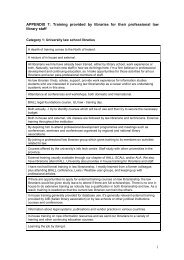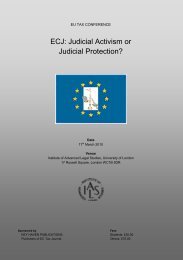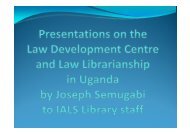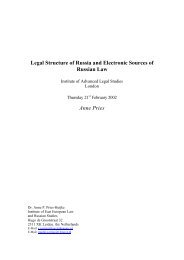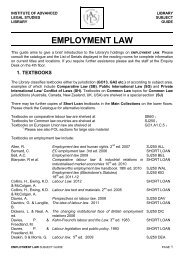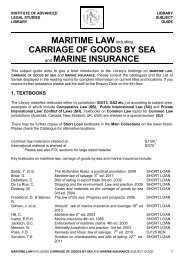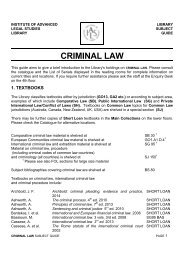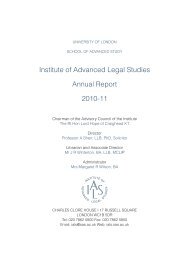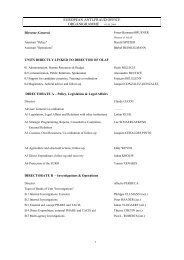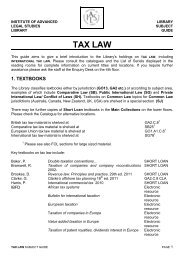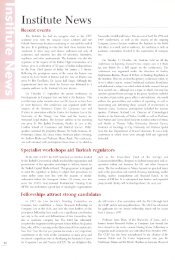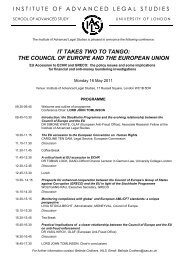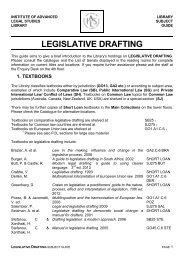a thesis - Institute of Advanced Legal Studies
a thesis - Institute of Advanced Legal Studies
a thesis - Institute of Advanced Legal Studies
You also want an ePaper? Increase the reach of your titles
YUMPU automatically turns print PDFs into web optimized ePapers that Google loves.
CONSTRUCTIVE TRUSTS. Ill<br />
(1857), 8 De Gr. M. & Q-. 787, where the action was successfully<br />
defended on the ground <strong>of</strong> laches.<br />
10. A., acting on behalf <strong>of</strong> himself and his partners B. and 0.,<br />
negotiates with X. for a lease to be granted to the firm. X.,<br />
without the knowledge <strong>of</strong> B. and 0., pays A. a sum <strong>of</strong> 12,000/. in<br />
consideration <strong>of</strong> his procuring the firm to take the lease. A. is a<br />
trustee <strong>of</strong> this sum for the firm. Faiccett v. Whitehouse (1829), 1<br />
Euss. & My. 132. Hichens v. Congreve (1828), ibid. 150, is to the<br />
same effect. See also Bentley v. Craven (1853), 18 Beav. 75.<br />
11. A., being director <strong>of</strong> a railway company, receives 5,000/.<br />
to pay for the purchase <strong>of</strong> a concession <strong>of</strong> which he is the concealed<br />
owner. A. is a trustee <strong>of</strong> the 5,000/. for the company on having<br />
the concession restored to him. Great Luxembourg Ry. Co. v. Magnay<br />
(1858), 25 Beav. 586.<br />
12. The facts are as in Taster v. Marriott, supra (5), except that<br />
A. assigns to B., who obtains the renewal. B. is a trustee for the<br />
remaindermen. In re Lord Hanelagh's Will (1884), 26 Ch. D. 590.<br />
The trustee is, however, entitled, on accounting for the advantage<br />
gained by him, to repayment <strong>of</strong> any costs and expenses<br />
properly incurred by him in obtaining such advantage, together<br />
with interest thereon and the value <strong>of</strong> any permanent improvements<br />
made to it by him, and to an indemnity against any<br />
liabilities properly contracted in respect there<strong>of</strong>.<br />
" He that seeks equity must do equity." " If," as Kekewich, J.,<br />
has put it (1897, 2 Ch. at p. 507), " you insist upon a man performing<br />
his duties as trustee and making over property as trustee,<br />
you must treat him as a trustee throughout, and you cannot<br />
expect him to perform his duties without at the same time exonerating<br />
him from expenditure incurred which benefits the property<br />
<strong>of</strong> which he is trustee." (See Holt v. Holt (1671), 1 Ch. Ca. 190 ;<br />
Keech v. Sandford (1726), Sel. Ca. Ch. 61; Rawe v. Chichester<br />
(1773), Amb. 715; Eyre v. Dolphin (1813), 2 Ball & B. 290; Ex<br />
parte Grace (1799), 1 Bos. & Pull. 376; Giddings v. CHddings<br />
(1826), 3 Euss. 241; In re Lord Ranelagh's Will (1884), 26 Ch. D.<br />
590; Roivley v. Ginnever, (1897) 2 Ch. 503.)<br />
The trustee is also entitled to a lien or charge for such expenses,<br />
&c. on the trust property. (Roicley v. Ginnever, supra.)



